In Science Salon # 117, Michael Shermer speaks with Matt Ridley about his book How Innovation Works: and Why It Flourishes in Freedom.
Tags
-
browse by topic
artificial intelligence
eSkeptic for May 26, 2020
Ten Years Away: …and Always Will Be

Peter Kassan reviews Artificial Intelligence: A Guide for Thinking Humans by Melanie Mitchell (Farrar, Strauss and Giroux, 2019).
eSkeptic for December 31, 2019

In Science Salon # 97 Michael Shermer speaks with former Jehovah’s Witness Amber Scorah about the psychology of religious belief and her new book Leaving the Witness: Exiting a Religion and Finding a Life. PLUS Peter Kassan reviews Artificial Intelligence: A Guide for Thinking Humans by Melanie Mitchell.
Daniel Oberhaus — Extraterrestrial Languages
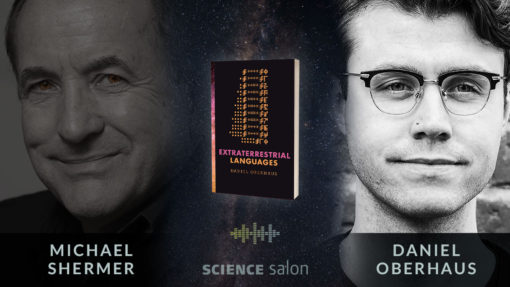
Exploring Earthlings’ various attempts to reach out to non-Earthlings over the centuries, Daniel Oberhaus poses some not entirely answerable questions. Is there not only a universal grammar (as Noam Chomsky has posited), but also a grammar of the universe? If we send a message into space, will extraterrestrial beings receive it? Will they understand? What languages will they (and we) speak? If we can’t even communicate with non-human mammals and primates, how are we going to communicate with sentient alien…
eSkeptic for October 22, 2019
The endlessly fascinating question of whether we are alone in the universe has always been accompanied by another, more complicated one: if there is extraterrestrial life, how would we communicate with it? In Science Salon # 88 Michael Shermer speaks with Daniel Oberhaus about his new book: Extraterrestrial Languages.
eSkeptic for August 27, 2019
In Science Salon # 80, Michael Shermer speaks with Bryan Walsh about his brand new book End Times in which he provides a stunning panoramic view of the most catastrophic threats to the human race.
Bryan Walsh — End Times: A Brief Guide to the End of the World
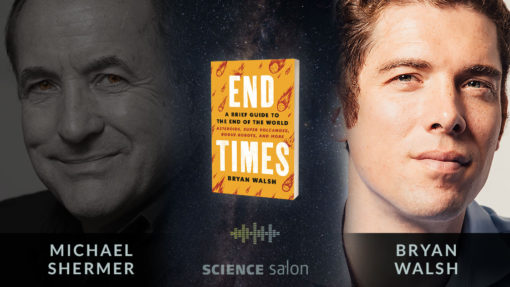
In Science Salon # 80, Michael Shermer speaks with Bryan Walsh about his brand new book End Times in which he provides a stunning panoramic view of the most catastrophic threats to the human race.
eSkeptic for March 13, 2019
In Science Salon # 57, Dr. Shermer speaks with legendary biologist and primatologist Dr. Frans de Waal about his empirical and theoretical work on animal societies, politics, intelligence, sentience, consciousness and, now, feelings and emotions. PLUS, using two cases as touchstones, Stewart Justman draws an analogy between the extraction of an apology and the extraction of a false confession to a crime of violence.
Dr. Frans de Waal — When Animals Weep (and laugh, love, fight, are afraid, get angry, seek revenge, and other human-like emotions)

In Science Salon # 57, Dr. Shermer speaks with legendary biologist and primatologist Dr. Frans de Waal about his empirical and theoretical work on animal societies, politics, intelligence, sentience, consciousness and, now, feelings and emotions. His latest book is called Mama’s Last Hug: Animal Emotions and What They Tell Us about Ourselves.
eSkeptic for December 26, 2018
In this wide-ranging dialogue Michael Shermer talks with Astronomer Royal Sir Martin Rees — a leading astrophysicist as well as a senior figure in UK science and a public intellectual in England and America.
Sir Martin Rees — On the Future: Prospects for Humanity
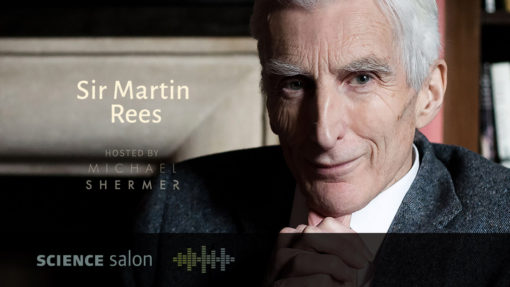
In this wide-ranging dialogue Michael Shermer talks with Astronomer Royal Sir Martin Rees — a leading astrophysicist as well as a senior figure in UK science and a public intellectual in England and America.
eSkeptic for July 9, 2018
Software programmer and technical writer Peter Kassan avers that a return to dualism is not justified. This article appeared in Skeptic magazine 22.4 (2017). About the image below: An illustration of the Cartesian theater. A tiny person sits in a movie theater inside a human head, watching and hearing everything that is being experienced by […]
Now Playing at a Cartesian Theater Near You: Dualism Returns
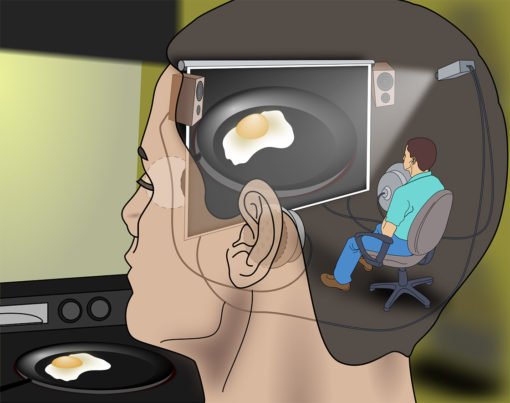
Software programmer and technical writer Peter Kassan avers that a return to dualism is not justified. This article appeared in Skeptic magazine 22.4 (2017).
Why We Should Be Concerned About Artificial Superintelligence

Matthew Graves warns that the same general problem-solving ability that makes artificial superintelligence a uniquely valuable ally may make it a uniquely risky adversary.
eSkeptic for November 8, 2017

It’s possible that artificially intelligent systems might end up far more intelligent than any human. In this week’s eSkeptic, Matthew Graves warns that the same general problem-solving ability that makes artificial superintelligence a uniquely valuable ally may make it a uniquely risky adversary.
eSkeptic for March 8, 2017
In this week’s eSkeptic, Michael Shermer discusses the question of whether artificial intelligence poses an existential threat to human beings; MonsterTalk interviews Guy Lyon Playfair about The Enfield Poltergeist; and Bill Nye Saves the World on Netflix and in the latest issue of Skeptic magazine 22.1!
eSkeptic for January 11, 2017
Stephen Beckner reviews season one of HBO’s most-watched TV series Westworld, and considers some of the concepts presented in the first ten episodes: creation, evolution, artificial intelligence, memory, consciousness, self-awareness, free will, and suffering. WARNING: This review contains spoiler alerts.
Out of the Loop, Lost in the Maze: The Stealth Determinism of Westworld

Stephen Beckner reviews season one of HBO’s most-watched TV series Westworld, and considers some of the concepts presented in the first ten episodes: creation, evolution, artificial intelligence, memory, consciousness, self-awareness, free will, and suffering. WARNING: This review contains spoilers from season one, and speculation about future events.
Dr. Andrew Hodges discusses Alan Turing: The Enigma, the book that inspired the film The Imitation Game starring Benedict Cumberbatch
It is only a slight exaggeration to say that the British mathematician Alan Turing (1912–1954) saved the Allies from the Nazis, invented the computer and artificial intelligence, and anticipated gay liberation by decades — all before his suicide at age 41. In November a major motion picture starring Benedict Cumberbatch as Turing will be released, based on the classic biography by Dr. Andrew Hodges, who teaches mathematics at Wadham College, University of Oxford (he is also an active contributor to…
Beware the Dystopian Visions of Celebrity Scientists
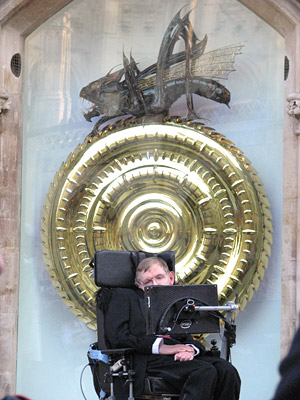
Mike McRae considers artificial intelligence, and critiques physicist Stephen Hawking’s opinions on the topic as “expert creep”—the phenomenon of scientists celebrated within one discipline choosing to make public statements on matters outside of their field of experience.
SKEPTIC App
Whether at home or on the go, the SKEPTIC App is the easiest way to read your favorite articles. Within the app, users can purchase the current issue and back issues. Download the app today and get a 30-day free trial subscription.








